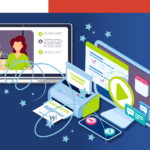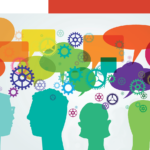Building Inclusive Workplaces Through Education
Written by Dr. Toni DiMella
The benefits of building an inclusive workplace are undeniable for both businesses and their employees. Numerous studies have revealed that diverse teams lead to improved productivity and higher profits. McKinsey & Company’s 2020 “Diversity Wins” reported that companies with high levels of gender diversity on executive teams were 25 percent more likely to experience above-average profitability than those with little or no DEI efforts.
When employee identities are recognized, valued, and respected, job satisfaction, engagement, and organizational commitment increase, resulting in lower turnover. A study by Deloitte found that these employees are four times more likely to stay with their organization. Additionally, more recent findings from Gallup’s “State of the Global Workplace” (2022) and “Q12® meta-analysis” (2024) reports found that companies with high employee engagement yielded higher productivity, profitability, sales, and customer metrics compared to those without these efforts in place.
A 2024 report from Culture Amp found similar findings. Employees who strongly believe their company values diversity are 84% engaged, while those who strongly disagree are 20% engaged. Employees who strongly believe their organization doesn’t value diversity are 3.3 times more likely to leave in 12 months, and companies that value diversity have a 6.8% higher stock price.
The Impact of DEI Training
Comprehensive DEI training is essential for cultivating an inclusive workplace and reaping its benefits. They equip employees with the knowledge and skills to recognize, respect, and value diverse perspectives.
DEI training is crucial in addressing unconscious biases. Unconscious biases are automatic and often unintentional mental associations based on race, gender, ethnicity, and other characteristics. These biases can influence decision-making processes, from hiring to daily interactions. DEI training helps employees become aware of these biases and provides strategies to mitigate their impact, leading to fairer and more equitable workplace practices. This improves hiring and promotion processes and enhances the work environment by fostering mutual respect and understanding.
DEI training also promotes cultural competency. Understanding and respecting different cultural backgrounds is vital in a diverse workforce. Cultural competency enhances communication, reduces misunderstandings, and fosters a more cohesive and collaborative work environment. Employees who feel understood and valued are more likely to be engaged and productive.
Finally, DEI training encourages inclusive behaviors that support inclusivity, such as active listening, empathy, and collaborative problem-solving. These behaviors help create a workplace where diverse perspectives are welcomed and valued. Inclusive behavior drives innovation, bringing together different viewpoints and ideas, leading to more creative solutions and better decision-making.
Explore the following success stories demonstrating how implementing comprehensive DEI training programs can positively impact the workplace, from increased employee engagement and satisfaction to higher profitability and innovation.

- Salesforce CEO Marc Benioff noticed disparities in gender representation and advancement within his company. Through candid conversations and data analysis, he discovered that women were not paid equally to their male counterparts. In response, Benioff adjusted salaries to ensure pay equity and embarked on a broader quest to understand and address unconscious biases within the organization (ISDI, 2023).
- Company Impact:
- Revenue Growth: Significant increase in company revenue.
- High Employee Satisfaction: Marked improvement in employee morale and engagement (ISDI).
- Company Impact:
- Sodexo has been recognized for its comprehensive DEI strategy, which includes initiatives such as mentoring programs, leadership training, and robust ERGs. The company’s DEI efforts focus on gender equality, multicultural inclusion, and LGBTQ+ support.
- Company Impact:
- Increased Employee Engagement: Employee engagement scores increased significantly in teams participating in their DEI programs.
- Better Financial Performance: Sodexo’s DEI initiatives have positively impacted the bottom line.
- Company Impact:
- Marriott International has long been a champion of diversity and inclusion. The company’s initiatives include comprehensive diversity training, a focus on supplier diversity, and strong support for women and minorities in leadership roles (Wesley et al., 2024).
- Company Impact:
- Higher Employee Retention: Marriott’s commitment to DEI has reduced turnover rates, particularly among minority and female employees.
- Increased Market Reach and Customer Loyalty: By fostering an inclusive environment, Marriott has attracted a more diverse customer base, enhancing customer loyalty and satisfaction.
- Company Impact:
- Google has implemented various DEI initiatives, including unconscious bias training, diversity hiring goals, and support for employee resource groups.
- Company Impact:
- Increased Representation: Google increased the percentage of women in technical roles and saw similar gains in the representation of underrepresented minorities.
- Improved Employee Satisfaction: Higher employee satisfaction and engagement scores contribute to a more positive and productive workplace (Oswald, Proto, & Sgrioi, 2022).
- Company Impact:
Types of DEI Trainings
To build an inclusive workplace, organizations can implement various types of DEI training, such as:
- Unconscious Bias Training: This training helps employees identify and address their unconscious biases. Activities might include implicit association tests (IAT), role-playing scenarios, and workshops on recognizing and mitigating bias in everyday interactions and decision-making processes.
- Cultural Competency Training: These sessions focus on understanding and appreciating cultural differences within the workplace. They may involve case studies, cultural immersion activities, and discussions on communication styles, customs, and conflict resolution strategies unique to different cultures.
- Inclusive Leadership Training: Tailored for management and executive teams, this training emphasizes the role of leaders in fostering an inclusive environment. It covers inclusive decision-making, promoting diverse voices, and creating policies supporting DEI initiatives.
- Microaggressions Training: This training helps employees recognize and address microaggressions—subtle, often unintentional, discriminatory comments or behaviors. Through real-life examples and interactive discussions, participants learn to understand the impact of microaggressions and how to respond to them constructively.
- Allyship Training: Allyship training encourages employees to support underrepresented groups within the organization. It includes strategies for being an effective ally, such as advocating for others, amplifying marginalized voices, and standing against discrimination.
Conclusion
Building inclusive workplaces through DEI training is not just about checking a box; it’s about cultivating a culture of respect, understanding, and collaboration. When effectively implemented, the benefits are manifold. DEI training increases employee satisfaction, improves team collaboration, and enhances creativity and innovation. Ultimately, organizations prioritizing DEI training build stronger, more resilient workplaces capable of thriving in a diverse global market.
eLearningDOC specializes in developing comprehensive DEI training programs tailored to your organization’s unique needs. Our expert team will work with you to design and implement training that addresses unconscious biases, promotes cultural competency, and fosters inclusive behaviors. Contact us today to learn how eLearningDOC can help you create a more inclusive, productive, and innovative workplace.








